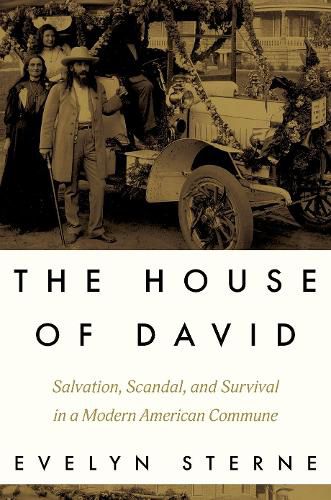Readings Newsletter
Become a Readings Member to make your shopping experience even easier.
Sign in or sign up for free!
You’re not far away from qualifying for FREE standard shipping within Australia
You’ve qualified for FREE standard shipping within Australia
The cart is loading…






In 1903, after seven years traveling the country as itinerant preachers, Benjamin and Mary Purnell moved to Benton Harbor, Michigan, where they founded a commune. Their settlement soon blossomed into a vibrant religious colony and booming business enterprise. They called it the House of David, and its members--hailing from across the United States and around the world--were Christian Israelites, members of a millennialist faith who seek to assemble the remnants of the lost tribes of Israel in a new Jerusalem. Once gathered, they believed, this community of 144,000 would never die. Over the next six decades about two thousand believers moved to Benton Harbor. They accepted stringent rules that included relinquishing all assets, practicing celibacy, and renouncing meat, hair-cutting, and traditional family ties--all in exchange for community, economic security, and the promise of immortality. Working in the commune's multiple business enterprises, they sought refuge from the abuses of industrial capitalism at a time of widespread social and economic upheaval, even as they brilliantly seized on the opportunities the modern economy had to offer. They also eagerly embraced popular culture by running a successful amusement park, performing in touring musical groups, and playing on barnstorming baseball teams that were the delight of audiences nationwide. The House of David thrived into the 1960s and lingers on as a tiny remnant today despite early decades characterized by a steady stream of financial and sexual scandals, a torrent of litigation, and obsessive coverage in the press.
In her study of this distinctive and little-known group, Evelyn Sterne reveals a larger story about religion and social change during a pivotal era in modern American history. Drawing upon extensive archival sources, many consulted for the first time, she sheds light on a host of questions, examining who joined this Christian Israelite community and why, and showing what their choices reveal about the strategies that immigrants and native-born Americans embraced at a time of disorienting economic, social, and cultural change. Sterne considers the critics who worked tirelessly to discredit the Michigan commune and what their efforts tell us about the limits of religious toleration and debates over what counts as "religion." Finally, she unveils how the House of David weathered decades of scandals to survive, becoming one of the longest-lasting intentional communities in American history.
$9.00 standard shipping within Australia
FREE standard shipping within Australia for orders over $100.00
Express & International shipping calculated at checkout
In 1903, after seven years traveling the country as itinerant preachers, Benjamin and Mary Purnell moved to Benton Harbor, Michigan, where they founded a commune. Their settlement soon blossomed into a vibrant religious colony and booming business enterprise. They called it the House of David, and its members--hailing from across the United States and around the world--were Christian Israelites, members of a millennialist faith who seek to assemble the remnants of the lost tribes of Israel in a new Jerusalem. Once gathered, they believed, this community of 144,000 would never die. Over the next six decades about two thousand believers moved to Benton Harbor. They accepted stringent rules that included relinquishing all assets, practicing celibacy, and renouncing meat, hair-cutting, and traditional family ties--all in exchange for community, economic security, and the promise of immortality. Working in the commune's multiple business enterprises, they sought refuge from the abuses of industrial capitalism at a time of widespread social and economic upheaval, even as they brilliantly seized on the opportunities the modern economy had to offer. They also eagerly embraced popular culture by running a successful amusement park, performing in touring musical groups, and playing on barnstorming baseball teams that were the delight of audiences nationwide. The House of David thrived into the 1960s and lingers on as a tiny remnant today despite early decades characterized by a steady stream of financial and sexual scandals, a torrent of litigation, and obsessive coverage in the press.
In her study of this distinctive and little-known group, Evelyn Sterne reveals a larger story about religion and social change during a pivotal era in modern American history. Drawing upon extensive archival sources, many consulted for the first time, she sheds light on a host of questions, examining who joined this Christian Israelite community and why, and showing what their choices reveal about the strategies that immigrants and native-born Americans embraced at a time of disorienting economic, social, and cultural change. Sterne considers the critics who worked tirelessly to discredit the Michigan commune and what their efforts tell us about the limits of religious toleration and debates over what counts as "religion." Finally, she unveils how the House of David weathered decades of scandals to survive, becoming one of the longest-lasting intentional communities in American history.